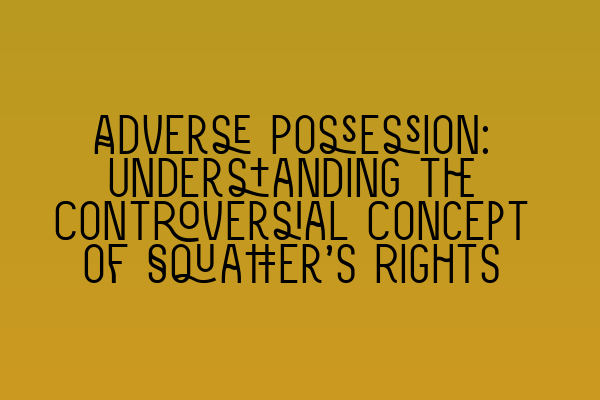Adverse Possession: Understanding the Controversial Concept of Squatter’s Rights
When it comes to property law, there are a multitude of complex and intriguing concepts that govern the rights and responsibilities of individuals. One such concept that often sparks controversy is adverse possession, also known as squatter’s rights. Adverse possession allows a trespasser to acquire legal ownership of someone else’s land if certain conditions are met. In this article, we will delve into the intricacies of adverse possession, exploring its origins, legal requirements, and the ethical implications it raises.
The Origins of Adverse Possession
The concept of adverse possession has its roots in ancient common law, where ownership of land was determined not only by legal title but also by possession and use. The idea behind adverse possession was to encourage land utilization and prevent land from lying idle or vacant. By rewarding those who maintain and improve the land, adverse possession aimed to promote the efficient allocation of resources.
Over time, the concept of adverse possession has evolved, and different jurisdictions have developed their own legal frameworks to govern its application. However, the core principle remains the same: if a person possesses another’s land without permission, openly, continuously, and exclusively for a specified period, they may have a legal claim to the property.
Requirements for Adverse Possession
To establish adverse possession, certain criteria must be met. These requirements vary depending on jurisdiction, but they generally include the following:
- Actual and Exclusive Possession: The squatter must physically possess the land and treat it as their own. They should exclude others from using or possessing the property during the adverse possession period.
- Open and Notorious Possession: The possession must be visible and apparent to others. It should put the true owner on notice that someone else is claiming ownership of the property.
- Continuous Possession: The squatter must occupy the land continuously, without any significant gaps or interruptions, for the duration specified by law.
- Hostile Possession: “Hostile” in this context does not mean aggressive or confrontational. It refers to the squatter’s occupation of the land without the owner’s permission. The occupation must be inconsistent with the true owner’s rights.
- Time Period: Each jurisdiction has its prescribed period for adverse possession, which typically ranges from 5 to 30 years. The squatter must possess the land for the entire period without interruption.
- Good Faith: Some jurisdictions require the squatter to have a genuine belief that they are the true owner of the land and that the possession is rightful.
It is important to note that meeting these requirements does not automatically grant ownership. The squatter must initiate legal proceedings to quiet title, seeking a court order recognizing their acquisition of the property through adverse possession.
Ethical Considerations and Controversies
The concept of adverse possession raises several ethical questions and controversies. On one hand, critics argue that adverse possession rewards trespassers and punishes rightful owners. They argue that it undermines the sanctity of property rights, as it allows someone who intentionally occupies another’s land without permission to potentially acquire ownership through the passage of time.
On the other hand, proponents of adverse possession argue that it promotes fairness and prevents land from remaining unused or neglected. They claim that adverse possession forces landowners to be diligent in monitoring and maintaining their property, discouraging absentee or dormant ownership.
The ethical dimensions of adverse possession often intersect with broader discussions on property rights, social justice, and the allocation of resources. Exploring the moral and legal dimensions of contract law, such as the ethics in contract law, misrepresentation in contracts, and the SQE contract law syllabus can provide additional insights into these related topics.
Understanding the intricacies of adverse possession is essential for property law practitioners. Examining landmark cases and influential judicial decisions within the realm of contract law, such as the SQE contract law, can enhance your understanding of the legal landscape and shed light on the complexities surrounding the concept of adverse possession.
As property law remains a dynamic and evolving field, it is crucial for solicitors and legal professionals to stay updated on the latest developments. Embracing best practices in contract law for services can ensure that your clients receive sound legal advice and representation in matters related to adverse possession or any other property law concerns.
In conclusion, adverse possession remains a controversial concept within property law. While it rewards individuals who unlawfully possess property for an extended period, it also seeks to promote the efficient allocation and utilization of land. Understanding the legal requirements and ethical considerations surrounding adverse possession is essential for property law practitioners and legal professionals, ensuring they can navigate and advise their clients effectively in this complex area of law.
